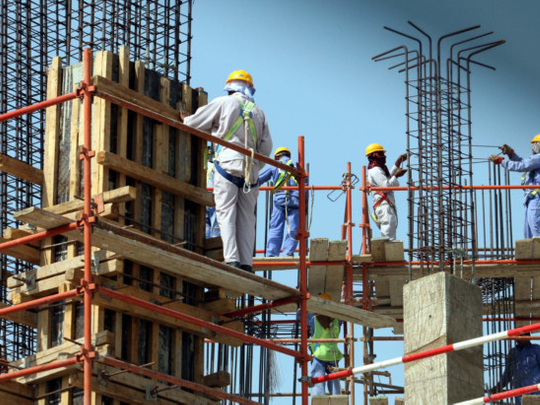
Dubai: Dubai’s construction and real estate sectors are facing a combined manpower shortfall of up to 500,000 heading into 2015, according to the findings of the Workforce Planning Study, which was commissioned by Dubai International Academic City (DIAC) and conducted by Deloitte. The study showed that building and construction project management skills are most lacking among senior levels, according to 43 per cent of companies surveyed. Likewise, 54 per cent of companies believe that design engineering skills are lacking among mid-level professionals, followed by civil engineering skills. Among entry level employees, health and safety skills were identified as most lacking.
“The growth in the property and construction sectors is driven by strong economic and demographic fundamentals, and robust government spending. Yet, high attrition rates among expatriate labour force and lack of skilled labour are causing an increased labour cost, which amounts to up to 25 per cent of construction costs. Furthermore, new green building standards have been developed in the GCC, focused on increasing energy efficiency and environmental sustainability. The continued growth of the construction industry will depend on its ability to address skill gaps and invest in new talent required to support technological developments,” said Dr Ayoub Kazim, Managing Director of Dubai International Academic City and Dubai Knowledge Village.
Real estate project financing, property pricing and appraisal, real estate evaluation, property market analysis and brokerage are also cited as key skills in demand. The resurgent construction market has also provided a need for skilled trades such as HVAC, plumbing and electrical engineering.
Students and graduates
The Workforce Planning Study surveyed over 2,400 students across 17 markets in the Middle East, Africa and Asia, as well as a cross section of companies. The study is aimed to help empower students and graduates by providing a better understanding of the employment prospects in the UAE market.
The real estate and construction sectors contributed 21 per cent of Dubai’s growth in the first quarter 2014, according to the Dubai Economic Outlook report, and accounts for 7.8 per cent of the Emirate’s overall GDP. Dubai has concluded the year 2013 with real GDP growth estimated at 4.7 per cent according to the Dubai Economic Department (DED). Current forecasts show that Dubai expects to add 100,000 new residents per year, according to the Dubai Statistics Centre, and annual tourist arrivals that are expected to more than double to at least 20 million under the tourism vision 2020.
Expo 2020
In addition, Dubai’s winning the bid to host the Expo 2020 is expected to be a major catalyst for development across all segments. HSBC estimates that about 45,000 new hotel rooms will be needed for the event, at a cost of more than Dh31 billion. The total infrastructure works for Expo 2020 is estimated at Dh12.54 billion, producing a large demand for talent and skilled workers to decent on the UAE for job opportunities. The influx of expatriate workers required to meet this demand would primarily affect the residential property segment, which has already seen a jump of 23 per cent year-on-year (YoY) in rental rates. In light of that, Oxford Economics estimates that securing the Expo will create more than 277,000 job opportunities in the UAE between 2013 and 2021; with the majority of the new jobs in the construction and tourism sectors.












